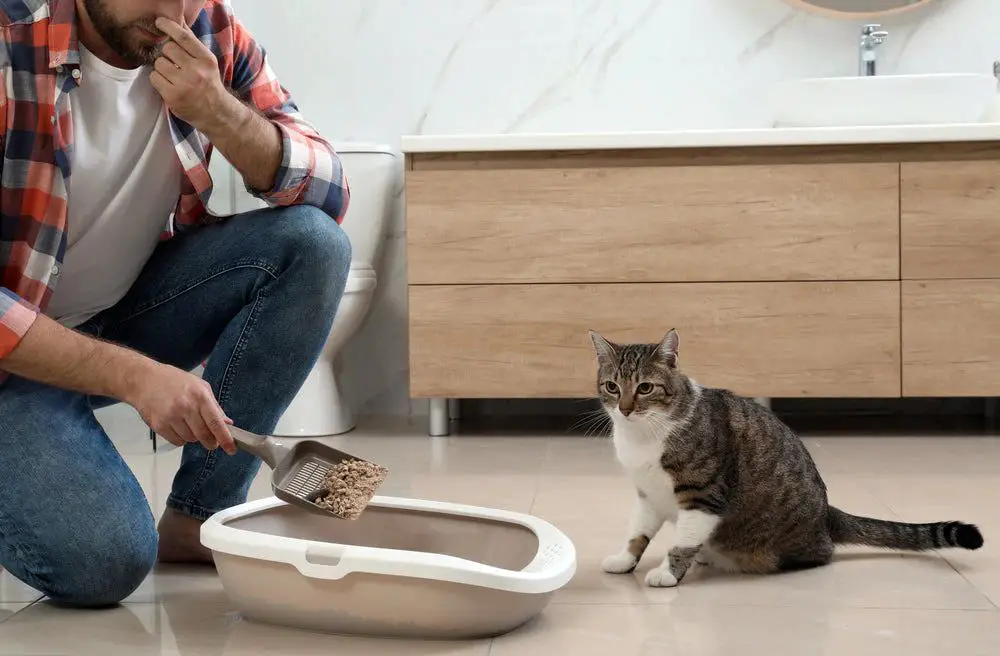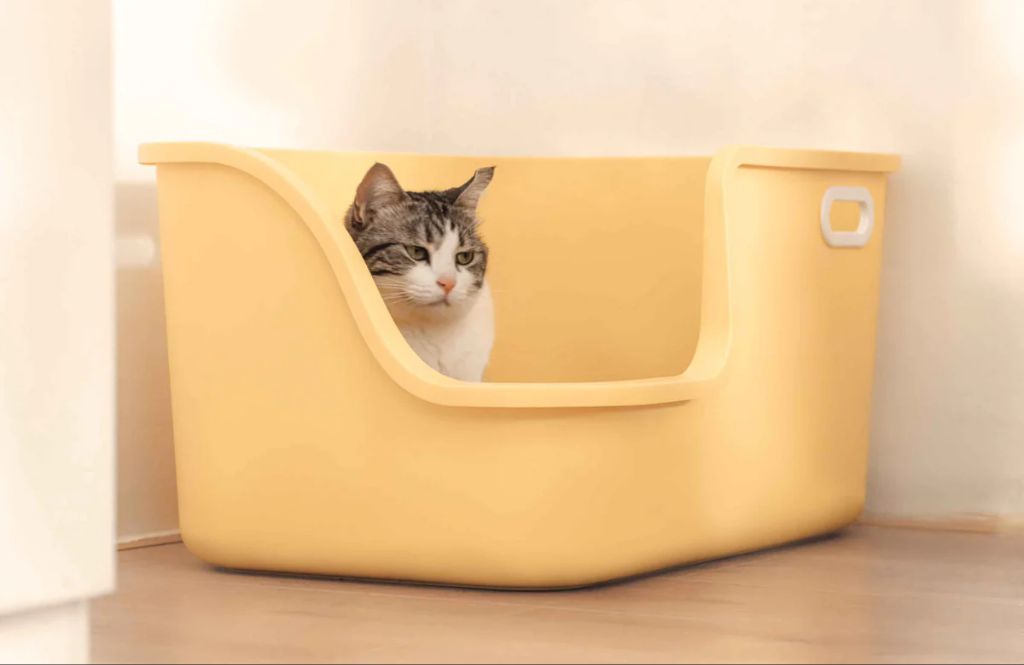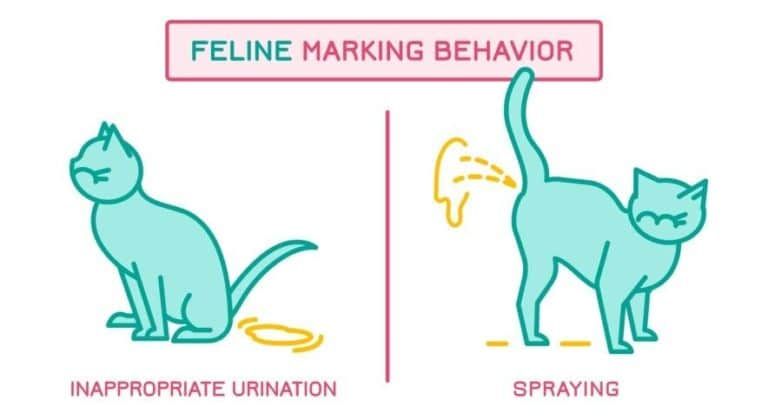Why Does Cat Poop Smell So Bad?
The pungent odor of cat feces is notorious among cat owners. As soon as the litter box is opened, an overpowering stench permeates the air. Many cat owners become accustomed to the smell over time, but visitors are often shocked by the odor emanating from the litter box. In this article, we’ll examine the science behind why cat poop smells so terrible.
Diet
Cats are obligate carnivores, meaning they primarily eat meat. Their diet in the wild consists of rodents, birds, reptiles and other small animals which are high in protein.
This high protein diet leads to smelly waste products in cats. Proteins contain more nitrogen than carbohydrates or fat, and the nitrogen byproducts in cat poop contain volatile sulfur compounds that give it a particularly strong, pungent odor.1 The smellier the protein source, the smellier the poop. For example, poop from cats fed fish-based foods usually smells worse than poop from cats fed chicken or beef.

To reduce odor, some cat foods use plant proteins like peas, lentils and potatoes instead of meat. While cats need meat in their diet, limiting protein content can result in less nitrogen byproducts and less smelly poop. High fiber foods can also help normalize digestion and pH levels, creating more solid waste and less odor.
Digestion
Cats are obligate carnivores, meaning they must eat meat to acquire certain nutrients like taurine that can’t be sufficiently obtained from plant material [1]. When cats eat protein, bacteria in their gut break it down into compounds like putrescin and cadaverin that make their feces smelly [2]. Unlike cats, omnivores like humans can obtain complete nutrition without meat, allowing for less smelly waste. Dogs are also omnivores, though they are still more carnivorous than humans. The high protein carnivore diet of cats leads to smelly compounds produced during digestion compared to most other pets.
Litterboxes
Litterboxes contain and concentrate the odor from cat urine and feces. As urine and feces accumulate in the litterbox, ammonia builds up which produces a strong, unpleasant odor. Lack of regular cleaning makes smells significantly worse.

According to Top 7 Litter Box Odor Control Solutions, the number one way to control litter box odor is to clean the litter box daily. Scooping out solid wastes and clumped urine daily prevents excessive build up of odors. Additionally, the source recommends washing the litter box thoroughly on a weekly basis.
Per Controlling Cat Litter Box Odor, the key rule to prevent litter box odors is constant cleaning. Scooping the litter box out at least twice daily is recommended to keep smells at bay.
Territory Marking
Cats have scent glands in various parts of their body, including their paws, cheeks, and tail area. They use these glands to deposit pheromones when rubbing against surfaces, which marks their territory and spreads their scent (1). Unneutered male cats in particular may mark by spraying small amounts of urine on vertical surfaces, leaving a pungent, musky odor. This allows them to establish their territory or communicate with other cats (2).

Spraying tends to occur more frequently in households with multiple cats that have not been spayed or neutered. It also becomes more common when cats feel stressed by environmental changes, new people, furniture rearrangement, or competing cats seen outdoors. While any cat can spray, this behavior is seen most often in unneutered males, who are marking their territory when urine spraying (1). So getting your cat neutered is an important step to reduce or eliminate spraying and the foul urine odor it leaves behind.
Sources:
(1) https://www.aspca.org/pet-care/cat-care/common-cat-behavior-issues/urine-marking-cats
(2) https://vcahospitals.com/know-your-pet/cat-behavior-problems-marking-and-spraying-behavior
Health Issues
Certain diseases like kidney disease can make poop extra smelly. Cats with kidney disease often have trouble concentrating their urine, which leads to dehydration. Dehydration results in extra smelly and more concentrated urine and feces. Kidney disease also causes toxins to build up in the bloodstream, which get excreted through urine and feces, making the smell worse.
According to the PrettyLitter blog, liver disease or gallbladder disease can also lead to foul-smelling poop, as these conditions impair the liver’s ability to digest fat and absorb nutrients from food properly.
In addition, gastrointestinal diseases like inflammatory bowel disease (IBD) can cause digestion problems that lead to terrible-smelling poop. So if your cat’s poop starts smelling significantly worse than usual, it’s a good idea to have your vet run some tests to check for underlying illness.
Reducing Odor
There are several tips that can help reduce the odor from your cat’s litter box:

- Scoop the litter box at least once a day, or more frequently for multi-cat households. The less waste sitting in the box, the less it can smell. [1]
- Use odor control litter designed to help trap odors. Look for litters made with activated charcoal or baking soda. [2]
- Clean the litter box thoroughly at least once a week using mild soap and hot water to remove stuck on waste.
- Use litter deodorizers and fresheners to help control odors between cleanings.
- Make sure the litter box is large enough for your cat. A box that is too small may cause your cat to miss while eliminating.
- Avoid placing the litter box near air vents or in small enclosed spaces where odors can build up.
Taking steps to reduce odor can help keep your home smelling fresh while also encouraging your cat to use their litter box consistently.
When to See the Vet
A sudden increase in your cat’s poop odor can indicate an underlying medical issue. If your cat’s poop smells much worse than normal or the smell persists even after changing litters or cleaning the litter box, it’s important to have your vet examine your cat.
Some medical conditions that can cause foul-smelling poop in cats include:
- Intestinal parasites like giardia or coccidia. Parasites compete with your cat for nutrients, which can lead to smelly poop. Treatment usually involves deworming medication prescribed by your vet (https://www.greatpetcare.com/cat-health/why-does-my-cats-poop-smell-so-bad/).
- Inflammatory bowel disease. This chronic condition causes inflammation in the digestive tract, resulting in smelly poop and diarrhea. Medications and dietary changes can help manage it.
- Malabsorption disorders like exocrine pancreatic insufficiency. These conditions prevent proper digestion and absorption of nutrients, leading to foul-smelling poop.
A vet exam can pinpoint if your cat has an underlying medical issue causing the smelly poop. Prompt treatment will help resolve the problem and get your cat’s poop smelling normal again.
Conclusion
In summary, cat poop tends to have a strong, unpleasant odor for several reasons. Cats are obligate carnivores, meaning their digestive systems are adapted to processing proteins and fats from meat, which leads to smelly waste. Their poop also contains pheromones and metabolites that allow cats to mark their territory. Health issues like inflammatory bowel disease can cause extra foul-smelling stool. While you can’t eliminate a cat’s natural odor completely, steps like cleaning the litter box frequently, using odor-control litter, and feeding a high-quality diet can help reduce the smell.
At the end of the day, smelly poop comes with having a cat. But being a diligent owner about your cat’s health, diet, and litter habits can make things more pleasant for both of you. The odor is a small price to pay for the joy and companionship cats bring to our lives.
References
[1] The American Society for the Prevention of Cruelty to Animals (ASPCA). “Cat Health.” https://www.aspca.org/pet-care/cat-care/cat-health. Accessed January 15, 2023.
[2] Axelsson, E., et al. “The genomic signature of dog domestication reveals adaptation to a starch-rich diet.” Nature, vol. 495, no. 7442, 2013, pp. 360-364., https://doi.org/10.1038/nature11837. Accessed January 15, 2023.
[3] Baker, Olga. “How Cats Evolved to Win the Internet.” The New York Times, July 13, 2016, https://www.nytimes.com/2016/07/14/science/cats-domestication.html. Accessed January 15, 2023.
[4] Bradshaw, John WS. “The evolutionary basis for the feeding behavior of domestic dogs (Canis familiaris) and cats (Felis catus).” The Journal of nutrition, vol. 136, no. 7, 2006, pp. 1927S-1931S., https://doi.org/10.1093/jn/136.7.1927S. Accessed January 15, 2023.

